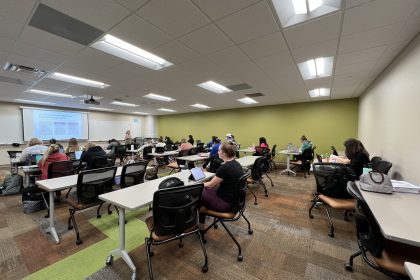Embedded Supports In Nursing
Western Technical College student Makayla House has known since she was in high school that she wanted to be a nurse. It’s why the decision to come to Western for the Nursing program was easy. But despite the college prep in high school, learning in college – especially in health care – can be overwhelming.
“There’s that initial shock of, ‘oh man, I’m in the Nursing program!’” she exclaims.

Accountability is the biggest challenge when entering any health care-related field, according to instructors. Success in the first term of the program is the biggest determination on whether a student will successfully complete the program. Pam Kamm, who teaches that first class, Fundamentals of Nursing, says the course requires a different set of skills than a typical general studies course.
“There’s a foundation of time management, of focus, within the learning process,” said Kamm. “If you don’t start with good building blocks in the beginning, you misstep and fall off.”
Just recently, Western introduced embedded supports within the Nursing program. This means a trained Academic Interventionist is placed in specific courses to help students with study questions, test prep, and connecting to other resources, such as Access Services or Western’s Learning Commons. In essence, it’s another resource for students within the classroom.
Every class, Academic Interventionist Michelle Blum is there to take notes, answer questions, and help students get more comfortable in a college setting. The relationships she builds with students can carry on in future course, whether she’s embedded in the course or not. She says test prep is a top concern because those in health care positions require specific certification by state and national boards, which requires standardized testing.
“Students must retain and build upon the knowledge they are learning; their studying must involve studying for long-term retention,” said Blum. “The content and exams also reflect a deeper level of critical thinking. This requires students to learn new or adapt their study methods.”
The move is part of a broader effort to increase third year graduation rates at Western. As the pool of potential students continues to shrink, retaining students becomes a greater focus. That means preventing a student from falling behind, before a student drops out entirely.
Because the initiative is so new, data is still not available on its effectiveness, but both instructors and students say having interventionists in the classrooms have been a big help.
“There’s been times I used her for both of my classes this semester,” said House. “She always responds immediately and posts her notes with the classes. It helps to get a better grip.”
“For me, it’s good knowing I have somebody there where they can pick up the pieces when I’m not there,” said Kamm.
To learn more information about Western’s Nursing program, visit www.westerntc.edu/nursing.
